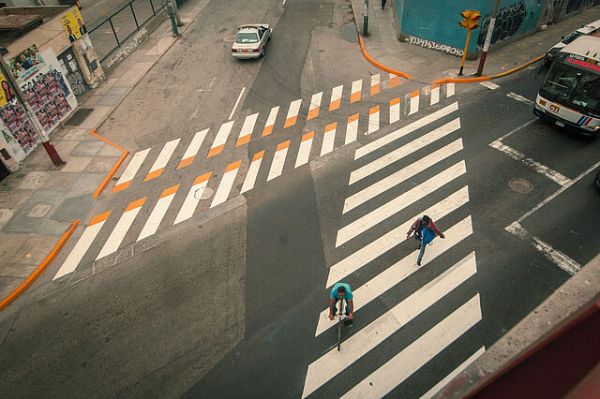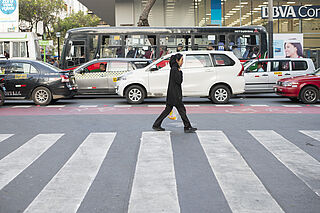Transforming Urban Mobility in Peru: TRANSPerú NAMA Support Project

TRANSPerú NAMA Support Project
Peru’s transport sector is responsible for some 40% of its energy-related greenhouse gas emissions. If action is not taken to reduce these emissions, they are likely to increase by 200 per cent by 2050, primarily due to rising traffic volumes and the spread of urbanisation. Driving is becoming increasingly popular in Lima and Callao because of the poorly organised public transport system. These two factors are leading to more cars on the roads, longer traffic jams and a high level of pollution. In addition, vehicles in Peru are old models running on fuel that does not meet the requisite quality standards.
To counteract the trend of rising CO2 emissions, the Peruvian Government, led by its Ministry of Transport and Communications (MTC), is developing the TRANSPerú – Nationally Appropriate Mitigation Actions (NAMA): over 50 measures designed to reduce greenhouse gas emissions in the transport sector. The NAMA facility, financed by the German Federal Ministry for the Environment, Nature Conservation and Nuclear Safety (BMU) and the UK Department for Business, Energy & Industrial Strategy (BEIS), is supporting these actions as part of the NAMA Support Project.
In that context, the project supports the transformation of the Peruvian urban transport sector into a sustainable low-carbon sector, reversing the trend of increasing road transport emissions by promoting integrated public transport systems, non-motorized transport and modernizing the vehicle fleet. Through constant explanation and positioning of mobility concepts at technical, political and decision-making levels within MTC’s structure, the project has played a key role in the changes that the Ministry has made in the way it manages the transport sector. The most crucial change can be seen in a redirection of its focus: it used to be centred around development of infrastructure – now, it aims to improve the quality of life of transport services users.
In line with the United Nation’s Sustainable Development Goals and 2030 Agenda, MTC pursues quality of life improvement through sustainable mobility, reducing private vehicle usage and promoting massive public transport. This includes boosting micromobility and electromobility, as well as human-centred design for road construction. With those goals in mind, MTC’s management of the transport sector revolves around three key concepts: urban mobility perspective, road safety and infrastructure for competitiveness.
The strategy for urban transport is based on three lines of action: institutionalisation of urban transport through normative development, regulation of the sector by passing laws and creating manuals and technical and financial support. Closely related to the first line of action is the institutional development to improve the management of local urban transport and introduce an integrated local public transport system. Key advances have been made by MTC, with project support, on this front:
- The creation of the Urban Transport Authority for Lima and Callao (ATU) during 2018, which was the most challenging, transformational and ambitious item of TRANSPerú NAMA and the Peruvian transport sector; it was a game-changer. Not only was the conceptual framework elaborated by the project, MTC and other partners and agreed upon with stakeholders in a long and intense process, but in ATU’s first year of operation, the project has been a key ally of this new institution.
- The National Program for Urban Transport, locally named Promovilidad, was created by MTC at the end of July 2019. This program focuses on assisting local governments of inner, intermediate cities in urban transport matters to help them in the process of elaborating sustainable urban transport plans. To achieve this objective, it will also support local governments in the preparation of required studies to implement integrated transport systems. (Direct assistance for the configuration and implementation of Promovilidad is being provided by the German Federal Ministry for International Cooperation and Development-funded DKTI project “Sustainable Urban Transport in Intermediate Cities”.
As TRANSPerú NAMA and the project aim to reduce greenhouse gas emissions in the transport sector, a great achievement was also met regarding the officialization the TRANSPerú NAMA´s mitigation actions as sector-specific Nationally Determined Contributions (NDCs). This process was carried out between MTC and the Peruvian Ministry of Environment (MINAM), with project support. As a result, five mitigation actions from the NAMA Policy Matrix are now sectoral NDCs, including:
- Implementation of complementary corridors for the integrated transport system;
- Current operation and BRT extensions;
- Implementation of Metro Lines 1 and 2;
- Sustainable urban transport national program – previously mentioned and now created as Promovilidad; and
- A scrappage and vehicle renewal national program.
Three other mitigation measures that relate to the TRANSPerú NAMA’s Policy Matrix have become NDCs for the energy sector, which includes transport-related actions.
Finally, the transformation process of the transport sector is also addressing two great social issues surrounding the transport sector. Gender inequality in the transport sector was the first. In 2018, through project support, a base line study on gender and urban transport in Lima and Callao was prepared. The study emphasised the issue of harassment of women, girls and boys and delivered alarming figures on how continuous and widespread sexual harassment was for these vulnerable groups. Based on this information, MTC has been working with various sectors – public and private institutions and the civil society – to design a regulatory framework that provides transport users with prevention and intervention mechanisms as well as with protocols in case of sexual harassment.
The second issue was corruption in transport sector. During 2019, specific activities were implemented that enabled this topic to be considered while moving ahead with matters related to urban transport. As a result, an integrity and anti-bribery program has been formed.



